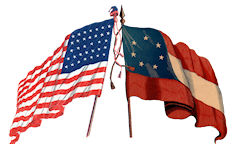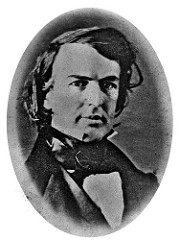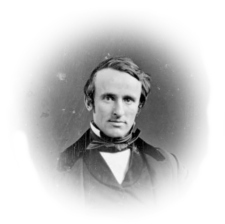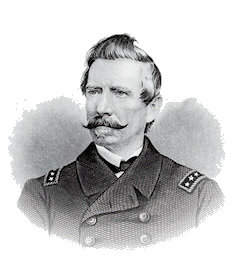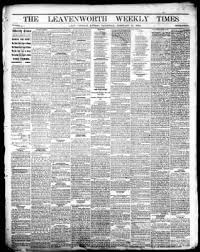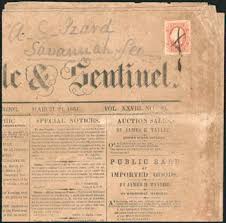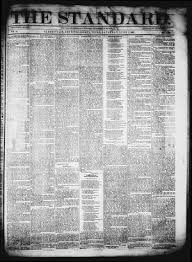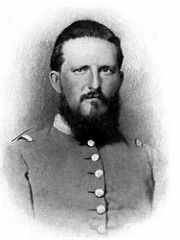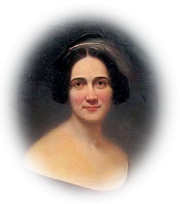August 5.–At Washington, the representatives of the newspaper press held a consultation with Gen McClellan by his special invitation, when it was unanimously decided that the following suggestions from him be transmitted to the editors of all the newspapers in all the loyal States and in the District of Columbia:
1st. That all such editors be required to refrain from publishing, either as editorial or correspondence, any description, from any point of view, of any matter that might furnish aid and comfort to the enemy.
2d. That they be also requested and earnestly solicited to signify to their correspondents here and elsewhere their approval of the foregoing suggestion, and to comply with it in spirit and letter.
It was resolved that the Government be respectfully requested to afford the representatives of the press facilities for obtaining and immediately transmitting all information suitable for publication, particularly touching engagements with the enemy.
–The following queries were put to the Confederate District-Attorney at Charleston:
First–Is it lawful for a citizen of the Confederate States to purchase of our enemy State stock or bonds of any of the Confederate States, and demand the interest when due?
Second–Is it lawful for the same parties to purchase notes given by merchants of the Southern Confederacy to Northern houses, and demand payment for the same?
Third–If lawful and proper to pursue the above course, would it not be equally legal for the small trader to buy merchandise of the enemy; or, in other words, does the law intend to operate in favor of the fortunate holders of capital against the humble dealers in wares and merchandise?
The response is as follows:–The acts specified by you certainly constitute “trading with the enemy” peculiarly objectionable, because they afford a direct assistance to the enemy, by the transmission of money to foster his resources. And, in addition, such conduct is highly unpatriotic, because directly injurious to the interests of the States and citizens of our Confederacy, whose obligations are thus withdrawn from the enemy’s country, where it is for the interests of the States that they should remain, since they could not there be called upon for payment during the war. Such operations are certainly worse than the simple purchase of merchandise in the enemy’s country, because they, at the same time, aid our enemies and injure our friends.–N. Y. Times, August 5.
–Claiborne F. Jackson, the deposed Governor of Missouri, publishes in the Memphis Appeal a document entitled “Declaration of Independence of the State of Missouri,” and addressed to the people of that State. The ex-Governor says he takes this step by virtue of authority conferred upon him by the State Legislature to do such things as to him might seem proper to “suppress the rebellion and repel invasion.” He thereupon assumes that the waging of war by the Federal Government upon the sovereign State of Missouri, ipso facto, sunders the connection of the latter from the former, and accordingly so declares–subject, however, to the ratification of the people at such future time as their Impartial and unbiased verdict can be obtained through the ballot-box, –(Doc. 163.)
–Gen. Lyon with his forces fell back on Springfield, Mo. The rebels were advancing on the latter place by four different roads, and their advance was from ten to fifteen miles distant. Three of the routes on which the enemy were moving, were the Neosho, Carthage, and the Overland roads. Gen. Lyon called in two thousand five hundred Home Guards from the neighborhood. Farther than this addition to his force, no other reinforcements seemed to be near. It was expected that the enemy were resolved on an immediate attack, from the fact that their commissariat was in a miserable condition, the rebels depending on forced contributions for temporary supplies.
It was generally remarked in Springfield that Gen. Lyon was perfectly confident of success, in the event of an attack. The latest estimate places the rebel force at twenty thousand. Their arms are thought to be very inferior, judged by the specimens taken during the skirmish at Dug Spring, where Gen. Lyon had no intrenchments, depending upon his splendid artillery in the open field.–St. Louis Democrat, August 9.
–In the Maryland Legislature to-day, S. Teaklo Wallis, from the committee to whom was referred the memorial of the police commissioners, submitted a long report, followed by preamble and resolutions, setting forth as arbitrary and unconstitutional the course of the Government in superseding the police board, and imprisoning Marshal Kane and the commissioners. The committee appealed in the most earnest manner to the whole people of the country, of all parties, sections, and opinions, to take warning by the usurpations mentioned, and come to the rescue of the free institutions of the country, so that whatever may be the issue of the melancholy conflict which is now covering the land with sacrifice and threatens to overwhelm it with debt and ruin, there may at least survive to us when it is over the republican form of government which our fathers bequeathed to us, and the inestimable rights which they framed it to perpetuate.–N. Y. World, August 6.
–The bark Alvarado, having a prize crew from the privateer Jeff. Davis on board, was chased ashore near Fernandina, Florida, and subsequently burned by the sailors of the United States ship Vincennes.–(Doe. 170.)
–A Sharp skirmish took place this morning in Virginia, opposite the Point of Rocks, between a detachment of sixty men of the Twenty-eighth Regiment of New York Volunteers, under the command of Lieut.-Col. Brown, and a party of cavalry of Capt. Mead’s company of the Confederate army. The Colonel ordered the Confederates to halt, which was not obeyed. The Unionists then fired on them and killed three, wounded two, and took twenty horses, with their equipments, and seven prisoners, who were taken before Gen. Banks. None of the Federal troops were hurt. The engagement occurred at daybreak. The advancing party forded the river, and caught the cavalry pickets of the enemy at breakfast.
The prisoners were brought into camp at Sandy Hook. Nearly every man captured had sword-arms and revolvers. On the sword-belt of one was marked in ink, “John H. Rollins, Leesburg, Va.” One captain of the rebels was killed. Previous reports from Colonel John C. Starkweather, of the First Wisconsin Regiment, stationed at Edward’s Ferry, stimulated the action which resulted so successfully. Colonel Starkweather had already made reconnoissances on the Virginia side, destroyed the rendezvous of the rebel pickets, and had but one man wounded, Mr. W. H. Langworthy, of Company E. All the captured are from Loudon County, Va.–(Doe. 164.)
–In the House of Representatives at Washington, Mr. Calvert, of Maryland, introduced a resolution providing for the appointment of a Committee to consider and report such amendments to the Constitution as may restore confidence and insure the preservation of the Union. Laid on the table.–Mr. May, of Maryland, was refused permission to introduce resolutions providing for the appointment of Commissioners to procure an armistice, and so compromise as to preserve the Union if possible; if not, to provide for the peaceful separation of those States that have seceded or may hereafter secede.– Mr. Diven offered a resolution declaring that, as rebels are now in arms against tho Government, all resolutions looking to a compromise are either cowardly or treasonable. The House refused to suspend the rules to receive Mr. May’s resolution. The Senate bill, increasing the pay of the volunteers and legalizing the acts of the President, was passed.
–A letter written on board the steam-sloop Brooklyn, off the mouth of the Mississippi River, giving an account of the manner by which the rebel privateer Sumter was suffered to run the blockade, was published in the Baltimore American.–(Doc. 165.)
–A band of rebels, numbering from one thousand to twelve hundred, made an attack upon a camp of Union men at Athens[1], Missouri, this morning at five o’clock. There was a considerable amount of arms and ammunition for United States troops stored at that place, under a guard of the troops composing the camp. The United States Volunteers numbered about three hundred and fifty men, under the command of Captain Moore. The fighting lasted about one hour, when the rebels retreated. In the mean time Captain Moore, having been reinforced by about one hundred and fifty men from Centralia, Iowa, on the opposite side of the river, gave chase to the rebels for about a mile and a half, killing one, taking eighteen prisoners, and capturing thirty-one horses and two secession flags. Several of the rebels were also wounded in the chase. After the battle, six or eight rebels were found dead on the field. In the afternoon the bearer of a rebel flag of truce to the Union camp was admitted. They carried off fourteen killed, and as many more wounded and missing. The rebels were led by Martin Green, a brother of ex-Senator Green. Of the Union men there were three killed and eight wounded.–(Doc. 166.)
–Several shots were exchanged between the U. S. blockading steamer off Galveston, Texas, and some sand batteries on shore.–(Doc. 167.)
[1] Athens is a small town in the extreme northeast of Missouri, on the Desmoines River, twenty-five or thirty miles from Keokuk.

